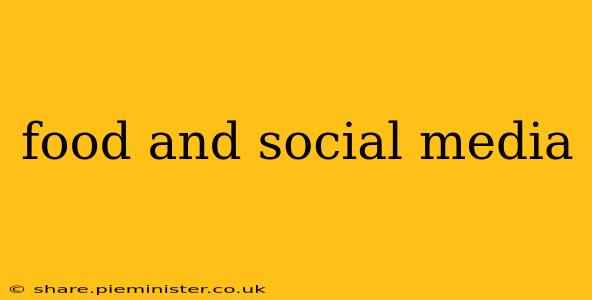Food and Social Media: A Deliciously Complex Relationship
Food and social media are inextricably linked. From the humble beginnings of sharing recipes via email to the current explosion of food blogging, vlogging, and influencer marketing, our relationship with food has been fundamentally altered by the digital world. This post delves into the multifaceted impact of social media on our culinary experiences and explores the opportunities and challenges this dynamic duo presents.
How has social media changed the way we experience food?
Social media has democratized food culture. No longer are we reliant on restaurant reviews in newspapers or the recommendations of friends and family. Platforms like Instagram, TikTok, and YouTube offer a global buffet of culinary inspiration, allowing us to discover new dishes, restaurants, and cooking techniques from around the world with a simple scroll. This access has fostered a greater appreciation for diverse cuisines and cooking styles, broadening our palates and culinary horizons. We’re no longer limited to the foods readily available in our local area; instead, we can vicariously experience the vibrant food scenes of Tokyo, Mexico City, or Marrakech through the lens of a smartphone.
What are the benefits of using social media for food businesses?
For food businesses, social media presents a powerful marketing tool. A well-crafted Instagram feed showcasing mouthwatering dishes can drive significant customer traffic. Targeted advertising campaigns on platforms like Facebook and Instagram allow businesses to reach specific demographics, maximizing their return on investment. Furthermore, social media provides a direct line of communication with customers, allowing for immediate feedback, addressing concerns, and fostering a sense of community. This interaction builds brand loyalty and strengthens customer relationships. Utilizing social media for running contests and promotions also significantly boosts engagement and brand awareness.
What are the downsides of social media's influence on our food choices?
While social media offers incredible benefits, it also presents certain drawbacks. The curated nature of online content often presents an unrealistic portrayal of food and its consumption. The emphasis on aesthetically pleasing dishes can overshadow the importance of nutritional value and healthy eating habits. The pressure to create “Instagrammable” food can lead to unnecessary food waste and an obsession with presentation over substance. Furthermore, the proliferation of misleading health claims and fad diets on social media can be detrimental to our well-being. Critical thinking and a healthy dose of skepticism are crucial when navigating the digital food landscape.
How can I use social media to improve my cooking skills?
Social media is a treasure trove of culinary knowledge. From detailed recipe videos on YouTube to step-by-step tutorials on Instagram, there’s a wealth of information available to improve your cooking skills, regardless of your experience level. Following skilled chefs and passionate home cooks provides inspiration and practical guidance. Engaging with online communities allows you to ask questions, share your own creations, and learn from the collective wisdom of other food enthusiasts. Remember to always verify information from multiple sources to ensure accuracy and reliability.
Does social media create unrealistic expectations about food?
Absolutely. The heavily filtered and stylized images often seen on social media create an unrealistic expectation regarding food's appearance and preparation. What appears effortless and delicious online may require hours of work, specialized equipment, or extensive culinary skills. This discrepancy can lead to feelings of inadequacy and frustration for home cooks striving to replicate the perfection they see online. It's essential to approach social media content with a critical eye, understanding that it often presents a curated and idealized version of reality.
What are some ethical considerations surrounding food and social media?
Several ethical concerns surround food and social media. Influencer marketing often lacks transparency, with sponsored posts not always clearly identified. The promotion of unhealthy or unsustainable food practices raises concerns about public health and environmental responsibility. The use of misleading imagery or deceptive editing techniques to enhance the appearance of food products is also ethically questionable. It's crucial for both creators and consumers to be aware of these issues and to demand greater accountability and transparency within the digital food space.
In conclusion, the relationship between food and social media is complex and multifaceted, offering both incredible opportunities and significant challenges. By understanding the benefits and drawbacks, approaching online content with a critical eye, and prioritizing ethical considerations, we can harness the power of social media to enhance our culinary experiences while mitigating potential risks.
